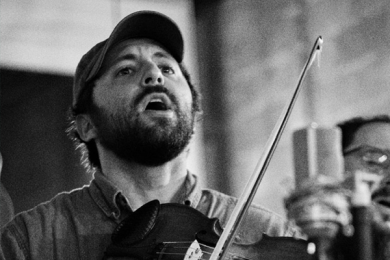A broken system: The national tour
News
If you're a playwright or a theater blogger—and if you're a playwright blogger than I don't know how you've been sleeping—then you've been reading, writing, and talking about the recently released book Outrageous Fortune: the life and times of the new American play by Todd London, the Artistic Director of New Dramatists, and Ben Pesner, manager of creative services at The Broadway League. (What is "manager of creative services at The Broadway League?")
Todd, Ben, and Victoria Bailey, Executive Director of the Theatre Development Fund (who published the book), are on a nationwide listening/talking tour about the book's findings. And, they were at the Playwrights Center all day on Tuesday, January 12.
The short version of their presentation: There is no real economy for playwrights in the United States today. None.
The longer version: It's really really really really really {keep saying "really" until you can't anymore} bad out there for a playwright. The system that has been set up, where a playwright is compensated for their work through royalties and commissions does not actually provide compensation for playwrights to actually work. (Only 3% of playwright income comes from royalties. Commissions average between $3000-4000 for projects that take between 6 months and two years.)
You should read the book. I haven't yet, I have to admit, and I'm sure that if I did I would read examples of positive trends or possible solutions. I pray there are examples in there of positive trends and possible solutions because otherwise, well—have you seen that punishing movie Requiem for a dream by Darren Aronofsky? People in the theater literally ducked under their chairs during portions of it; I think one guy barfed he was so upset. It'd be like rewatching that movie, and while I thought it was a worthwhile experience, I don't want to go through it again.
Have you gotten any impression that I'm not sure what to say about this Outrageous Fortune presentation? I feel as though this is an important subject in this industry and must be addressed by anyone who cares about the continuing health of the American theater. I also feel as though Todd London, Ben Pesner, and Victoria Bailey clearly care passionately about the continuing health of the American theater and therefore have probably created a book that lays out the facts and figures in a way that maybe someone can use them to create change.
But, I'm having trouble culling the important parts of their presentation simply because they seemed to be summarizing what I and my playwrighting peers (and a good many young freelance directors too) have been saying for the last ten years while being dismissed as whiners who are too artsy-fartsy flighty to understand the "system". So, I'm glad that they published this book, but, at this point, I almost feel that if I keep talking about it, I'll never write another creative word again.
Thankfully, the internet is abuzz with talk about this book, and you can read a whole bunch of different intelligent responses to the book in specifics and in general on this blog, Parabasis (which I honestly do believe is a good daily read for theater folks almost all the time). Go there. Read that stuff. Maybe you can tell me what they said. I honestly can barely look.
A couple final, random thoughts that may or may not give you additional worthwhile information:
- The room was mostly littered with playwrights—myself, Rosanna Staffa, Carlyle Brown, Carson Kreitzer, Kristoffer Diaz, Christina Ham, Aditi Kapil—and staff of the Playwrights Center, but it was encouraging to see other Minnesota theater makers there, including Peter Rothstein, Hal Cropp, Miriam Must, and Ben McGovern. That was very nice of them to care. And to see they cared.
- A response from Todd London that jumped out at me in response to a question about MFA programs, basically said, MFA programs have created a "professional track" in a field that used to be either commercial or amateur and that doesn't actually have any "professional track" jobs except for administrators.
- Another quote from Todd London in response to Carlyle Brown's question about why this study even needed to be conducted, i.e., did Artistic Directors and Boards of Directors really not know that all their favorite playwrights weren't working or getting paid anything? London said, and again I'm paraphrasing, that through the study they found that there are a lot of smart, well-intentioned people who want to work in a system that supports theater and new plays but that even with all the best intentions—sometimes as a result of the unintended consequences of those good intentions—the system is just broken.


